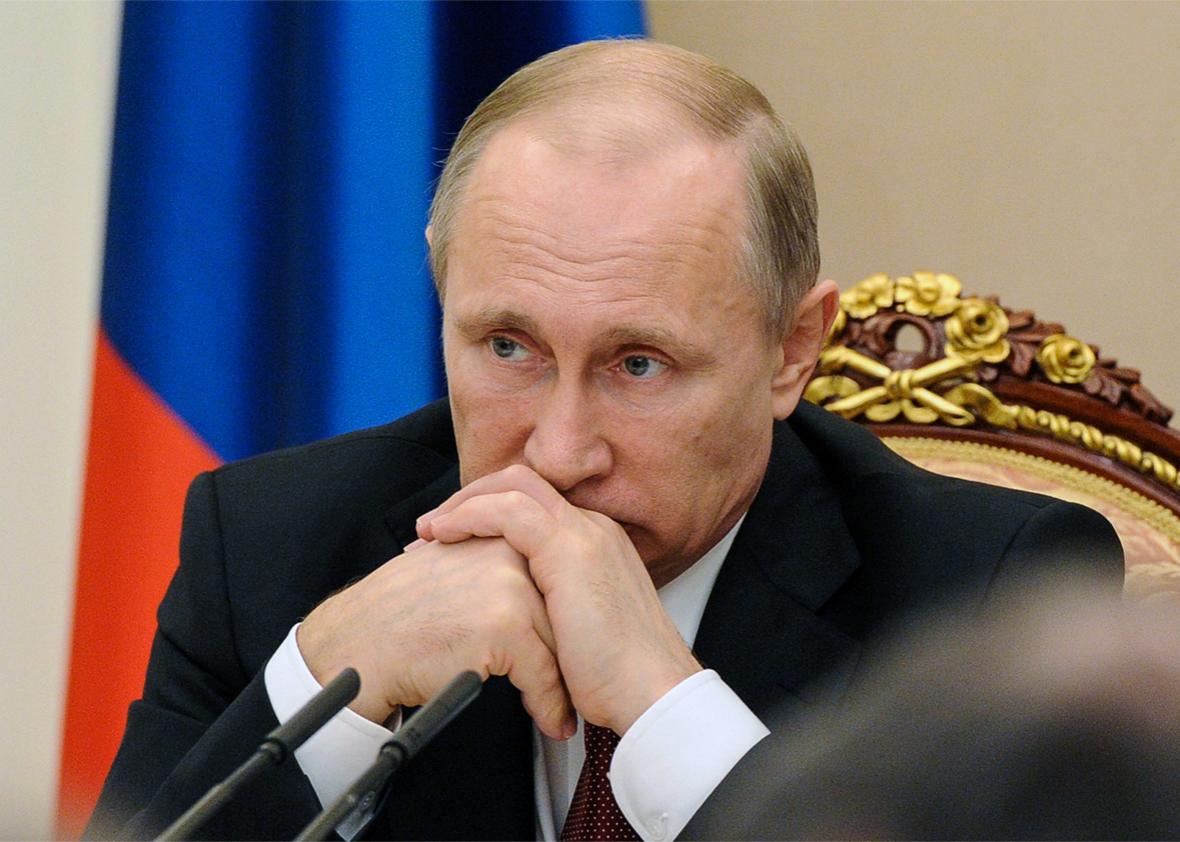It is always tempting, when writing about the Russian president, to lapse into geopolitical waffle. Though the Cold War ended a quarter-century ago, we are still accustomed to thinking of Vladimir Putin as a global actor, a representative of eternal Russian interests, the inheritor of czarism/Lenin/Stalin, a man who inhabits a Kissingerian world of state actors who compete against other state actors for control over territory, all of them playing a gigantic game of Risk.
To those wearing this particular set of rose-colored glasses, Putin’s recent foray into Syria makes a certain kind of sense. His amazingly well-timed decision—just before the U.N. General Assembly session!— to send hundreds of Russian soldiers, 28 fighter jets, helicopters, tanks, and artillery has been variously described as a bid to re-enter the modern Great Game of the Middle East, to extend Russian influence to the Mediterranean, to shore up the Iranian government, and to displace the United States as a regional leader.
All of which misses the main point. For Putin’s entry into Syria, like almost everything else that he does, is part of his own bid to stay in power. During the first 10 years he was president, Putin’s claim to legitimacy went, in effect, like this: I may not be a democrat, but I give you stability, a rise in economic growth, and pensions paid on time. In an era of falling oil prices and economic sanctions, not to mention vast public-sector corruption, that argument no longer works. Russians are demonstrably poorer this year than they were last year, and things look set to get worse. And so his new argument goes, in effect, like this: “I may not be a democrat and the economy may be sinking, but Russia is regaining its place in the world—and besides, the alternative to authoritarianism is not democracy but chaos.”
In fact, Putin does not have the military muscle to project genuine influence into the Middle East. He won’t be able to build up his forces stealthily, as he did in Ukraine. Nor does he get anything of material or strategic importance out of his alliance with the embattled Syrian dictator, Bashar al-Assad. But he will attain the appearance of influence, and that’s all that matters. It could certainly be useful abroad: Together with his appearance at the U.N. for the first time in a decade and his long interview with Charlie Rose, it might—indeed, almost certainly will—help draw U.S. and European attention away from the humanitarian disaster he has created in eastern Ukraine, and help lift the sanctions that are dragging down the Russian economy and hitting the wallets of some of his closest friends.
But the appearance of influence is even more useful at home. You and I might assume that the prospect of a Russian street revolution is far-fetched, but Putin, having watched what happened in East Germany in 1989 from his KGB office in Dresden, and having then watched what happened to Muammar Qaddafi in 2011, clearly worries about it quite often. To stave off this fate, his state-controlled television rumbles on constantly about the fecklessness of Europe and the corruption of America—just in case any Russians are tempted by the lure of democracy—as well as the total chaos that his policies have helped foment in Syria. The arrival of Russian troops, some in transit directly from the Ukrainian border, is designed to reinforce this message: Putin is ready to help another dictator re-establish dictatorship, reassert control, and imprison all of his enemies, in Syria and, if needed, in Russia too.
This is not what he’s going to say. Putin has just told Charlie Rose that Assad should negotiate with the “rational opposition,” that “only the Syrian people are entitled to decide” who should rule them. But Assad has already murdered quite a lot of what used to be the rational opposition, often using Russian weapons. And the “Syrian people” haven’t had much say in who sells weapons to Assad, who arms the Islamic State, and who fuels the conflict in their country.
Of course, the Syrian people aren’t really the point here—and the Russian people aren’t either. Putin’s invasion of Ukraine has been bad for his countrymen and bad for his country—for its economy, its image, its influence—and a tragedy for Ukraine. Expect the same kind of outcome from his incursion into Syria, too.
